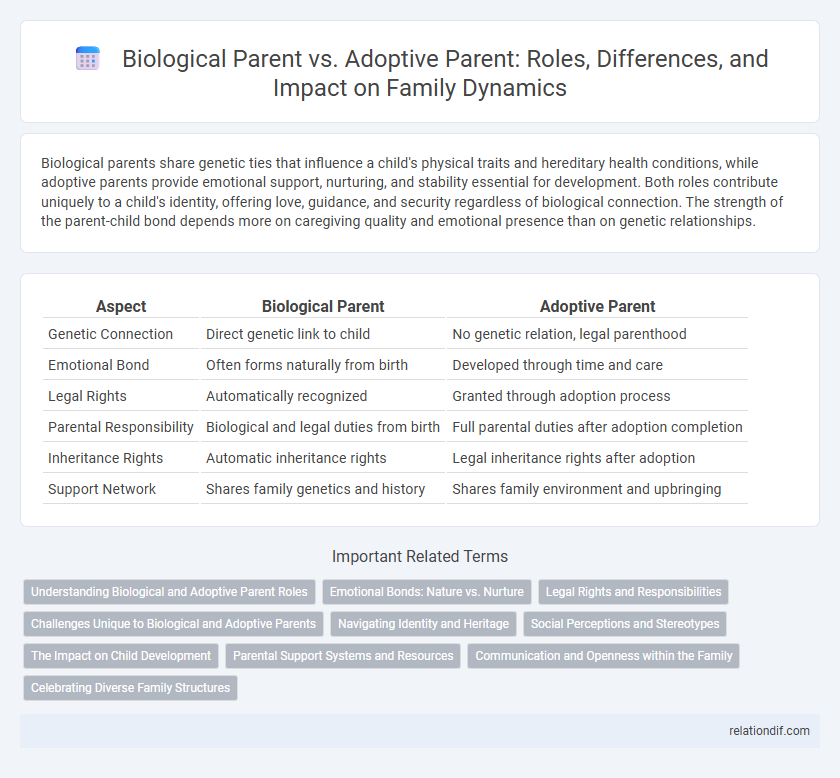Biological parents share genetic ties that influence a child's physical traits and hereditary health conditions, while adoptive parents provide emotional support, nurturing, and stability essential for development. Both roles contribute uniquely to a child's identity, offering love, guidance, and security regardless of biological connection. The strength of the parent-child bond depends more on caregiving quality and emotional presence than on genetic relationships.
Table of Comparison
| Aspect | Biological Parent | Adoptive Parent |
|---|---|---|
| Genetic Connection | Direct genetic link to child | No genetic relation, legal parenthood |
| Emotional Bond | Often forms naturally from birth | Developed through time and care |
| Legal Rights | Automatically recognized | Granted through adoption process |
| Parental Responsibility | Biological and legal duties from birth | Full parental duties after adoption completion |
| Inheritance Rights | Automatic inheritance rights | Legal inheritance rights after adoption |
| Support Network | Shares family genetics and history | Shares family environment and upbringing |
Understanding Biological and Adoptive Parent Roles
Biological parents provide genetic heritage and prenatal development crucial for a child's physical and psychological traits, while adoptive parents offer nurturing, emotional support, and legal guardianship that shape the child's environment and upbringing. Both roles are essential for a child's well-being, emphasizing the importance of love, stability, and care over genetic connections. Research highlights that secure attachment and positive parenting practices in adoptive families significantly influence healthy child development and identity formation.
Emotional Bonds: Nature vs. Nurture
Emotional bonds between children and parents develop through complex interactions influenced by both biological connections and nurturing behaviors. While biological parents often share genetic predispositions that may affect emotional attunement, adoptive parents cultivate deep bonds through consistent caregiving, warmth, and responsiveness. Research in developmental psychology highlights that secure attachments and emotional well-being are more strongly correlated with the quality of nurturing than genetic relatedness.
Legal Rights and Responsibilities
Biological parents typically have automatic legal rights and responsibilities for their children, including custody, visitation, and financial support, unless these rights are legally terminated. Adoptive parents gain full legal rights and responsibilities once the adoption process is finalized, ensuring they can make medical, educational, and welfare decisions for the child. Courts prioritize the best interests of the child when determining or modifying parental rights, regardless of biological or adoptive status.
Challenges Unique to Biological and Adoptive Parents
Biological parents often face challenges related to genetic health history and managing inherited traits, while adoptive parents navigate complexities around building biological connections and addressing identity questions for the child. Both types of parents may encounter emotional struggles, but adoptive parents uniquely manage legal processes and potential attachment issues. Understanding these distinct challenges helps tailor support systems effectively for each family dynamic.
Navigating Identity and Heritage
Biological parents provide genetic heritage that shapes a child's physical traits and ancestral history, deeply influencing identity formation. Adoptive parents contribute to a child's social and emotional development, creating a nurturing environment that supports cultural values and personal growth. Balancing biological roots and adoptive family experiences helps individuals navigate complex layers of identity and heritage.
Social Perceptions and Stereotypes
Social perceptions of biological parents often emphasize genetic ties and inherent responsibilities, while adoptive parents face stereotypes questioning their legitimacy and emotional authenticity. Studies reveal adoptive families frequently confront societal bias that frames adoption as a secondary or less natural form of parenthood. These misconceptions impact family dynamics and stress the importance of recognizing parenting roles based on commitment and care rather than biology alone.
The Impact on Child Development
Biological parents contribute genetic inheritance influencing a child's physical traits and potential health predispositions, which can affect developmental milestones. Adoptive parents provide nurturing environments, emotional support, and social stability crucial for cognitive and emotional growth, often mitigating early adversity impacts. Research highlights that consistent caregiving quality, rather than biological relation, plays a pivotal role in shaping resilience and attachment security in children.
Parental Support Systems and Resources
Biological and adoptive parents both benefit from specialized parental support systems tailored to their unique needs, including counseling, financial aid, and legal resources. Adoption agencies and family support groups offer targeted programs that address the emotional and social complexities faced by adoptive families, while biological parents often access community-based parenting workshops and healthcare services. Access to these resources helps strengthen family bonds and ensures the well-being of children in diverse family structures.
Communication and Openness within the Family
Effective communication and openness are crucial in both biological and adoptive families to build trust and emotional bonds. Adoptive parents often emphasize transparent conversations about adoption to foster a sense of security and identity in the child. Biological parents benefit from maintaining open dialogue to address developmental needs and nurture authentic relationships.
Celebrating Diverse Family Structures
Biological parents provide genetic connections, while adoptive parents offer love and commitment that shapes a child's identity regardless of biology. Both family structures create nurturing environments essential for emotional growth and stability. Recognizing diverse family forms enriches societal understanding and supports inclusive definitions of parenthood.
biological parent vs adoptive parent Infographic

 relationdif.com
relationdif.com